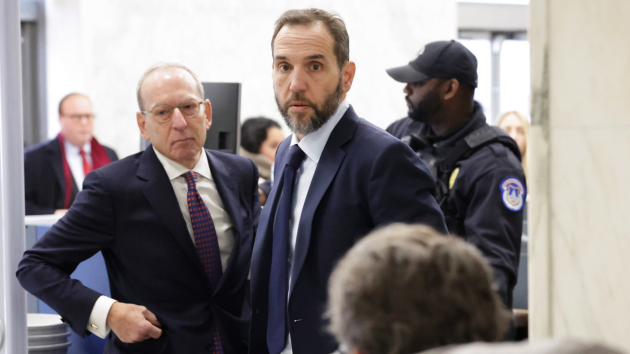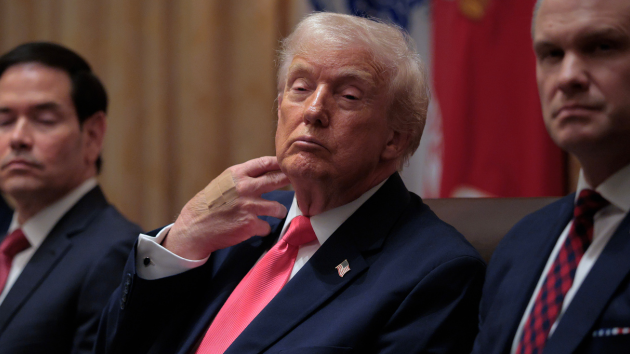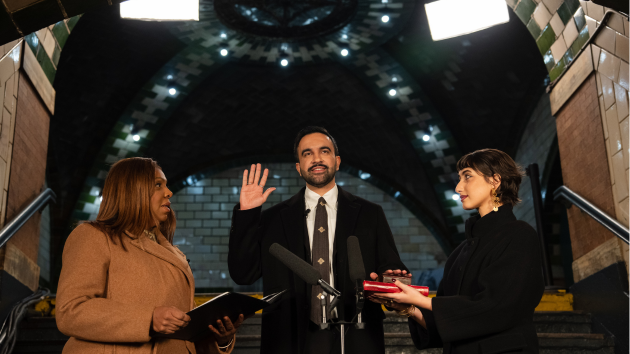As Trump returns to the border, a closer look at what he’s pledging to do on immigration if elected
Written by ABC Audio ALL RIGHTS RESERVED on February 29, 2024

(WASHINGTON) — Former President Donald Trump has made immigration a central campaign message and spent nearly every appearance on the trail talking about the issue while touting what he would do about it should he win another term.
Both he and President Joe Biden are making competing trips to Texas on Thursday to visit the border, with each faulting the other’s policies.
Biden is using his trip to make another push for the Republican-led House to pass a bipartisan Senate border security agreement — a deal that Trump helped tank because he claimed that it wasn’t truly effective or “great.”
The Biden campaign fired back at Trump on Thursday, in part, by accusing him of “playing games for his own political gain,” a spokesperson said.
More broadly, surveys show concern about immigration has been rising among some voters.
According to Gallup’s February polling, 28% of Americans overall say immigration is the most important problem, up from 20% in January and 8% last June. But there has been little movement among Democrats, only 10% of whom cite immigration as the most important problem. By contrast, 57% of Republicans do — up from 37% in January.
An ABC News/Ipsos poll from January found Biden had just an 18% approval rating for his handling of immigration at the southern border — the lowest in two decades.
On Thursday, Trump is expected to take part in briefings with border officials and deliver remarks in Eagle Pass, Texas, as well as participate in an interview with Fox News’ Sean Hannity along with Texas lawmakers including Sen. Ted Cruz and Gov. Greg Abbott.
He has vowed to implement a series of policies including reinstating and expanding his controversial travel ban on people coming into the U.S. from certain majority-Muslim countries; conducting what he calls the largest deportation operation in the country’s history; and — in a revamp of his 2016 campaign — continuing work on the southern border wall.
“We’re gonna straighten things out,” Trump said on Saturday in South Carolina.
He went on to boast that in 2016, “We had a bad border and I talked about the border a lot, talked about it a lot and said we’re going to fix it. …We fixed it very quickly.”
He echoed that as he arrived in Texas on Thursday: “Nice weather, beautiful day, but a very dangerous border. We’re going to take care of it.”
What Trump has done and wants to do about immigration
The former president has made sweeping promises on immigration before, though he didn’t fulfill some of those key pledges — either because he faced legal roadblocks, Democratic-led resistance in Washington or he said he could achieve something highly unusual, such as having Mexico pay for the border wall.
Overall, there were fewer deportations during the Trump administration compared to his predecessor former President Barack Obama, according to data released by the Department of Homeland Security.
Under the Biden administration, the number of deportations further declined.
During his first presidential campaign, Trump made the ambitious vow that he was going to build a new wall along the southwest border; by the end of his term, however (and after various funding fights in Washington), he had only implemented about 450 miles of barriers — much of which was just upgrading existing barriers that already existed.
Still, Trump continues to tout the barriers as one of his biggest accomplishments during his presidency, frequently reminding voters at 2024 campaign rallies that he built and renovated nearly 500 miles of the border wall. Supporters often bring up that rhetoric when asked why they back Trump.
Trump did implement a signature “travel ban” during his first term, rejecting visas to people coming from countries he claimed didn’t have enough screening, including Iran, Syria, Yemen, Libya, Somalia and North Korea.
On Biden’s first day as president, he ended Trump’s restriction, which was criticized by advocates as unfairly targeting Muslim countries.
Thousands of migrant families were infamously separated under Trump’s crackdown on unauthorized border crossings during the first two years of his presidency, with children and infants taken away from their parents and sent to shelters and other facilities while the adults were prosecuted.
Trump eventually ended the separations in the summer of 2018 amid widespread outcry, but the policy led to numerous lawsuits from migrant families alleging the government’s negligence, abuse and harm.
Trump has projected that if he is elected again, he will deport millions of unauthorized immigrants and end so-called “catch and release” practice, in which migrants are arrested at the border and released from the government’s custody to appear in court later.
While in the White House, Trump helped usher in new policy changes in the DHS to expedite deportations but for a while in 2019, his administration resorted to “catch and release” amid a drastic surge in arrivals of migrants at the border.
For his 2024 reelection bid, Trump has campaigned extensively on the message that he will “terminate every open border policy of the Biden administration” — beginning with what he claims would be the “largest domestic deportation in American history.” (The Biden administration has pushed back on such criticism, saying they seek to enforce all laws at the border.)
Trump’s deportation plan has raised questions about the feasibility of such a project, as it would likely require the mobilization of numerous law enforcement officials and expanded detention facilities across the country — just to process the new arrests.
To carry out his promise, Trump has vowed to direct “massive portions” of law enforcement toward immigration enforcement, including from federal agencies like the FBI and moving troops who are currently stationed overseas.
As he heads into a potential second term, Trump has said he is determined to fulfill the policies he started to implement on immigration during his first term — while using disparaging language to describe unauthorized migrants.
Making claims about criminals and terrorists “pouring in” through the border, Trump has been campaigning on the promise of bringing back his “Muslim ban” and even implementing an ideological screening for those coming into the country.
Throughout the 2024 election cycle, the former president has repeatedly claimed some immigrants are “poisoning the blood” of the country, which echoes Adolf Hitler’s use of similar language in his book “Mein Kampf.”
The Trump campaign has rejected the comparison as “ridiculous.”
In recent weeks, Trump has also labeled migrants in the country illegally as “violent criminals” and focused on “migrant crime,” including by pointing to the recent killing of Georgia college student Laken Riley.
Police have charged Jose Ibarra with murder in connection with Riley’s death, but he has not entered a plea. He was previously arrested by U.S. Customs and Border Protection for unlawful entry from Venezuela, officials said.
ABC News’ Isabella Murray and Nathaniel Rakich contributed to this report.
Copyright © 2024, ABC Audio. All rights reserved.
 KVSP
KVSP 




